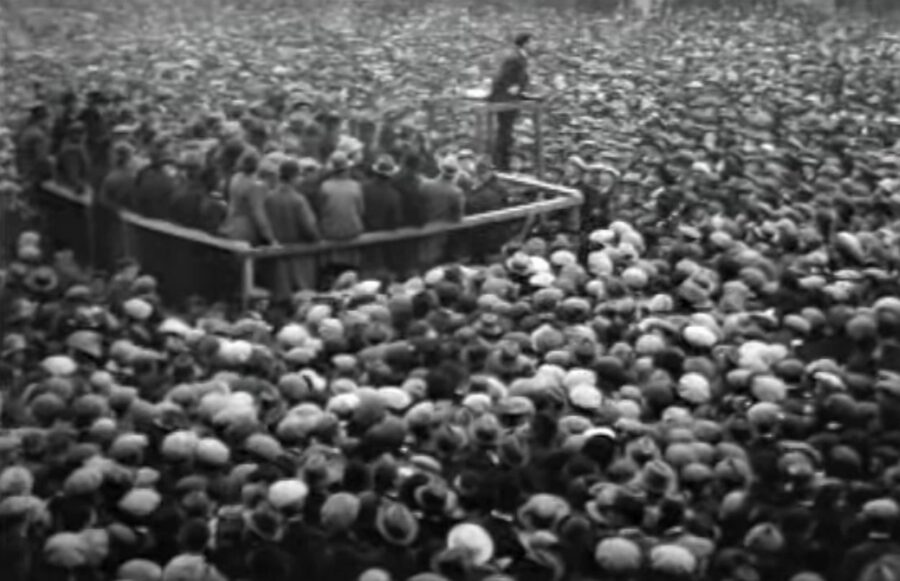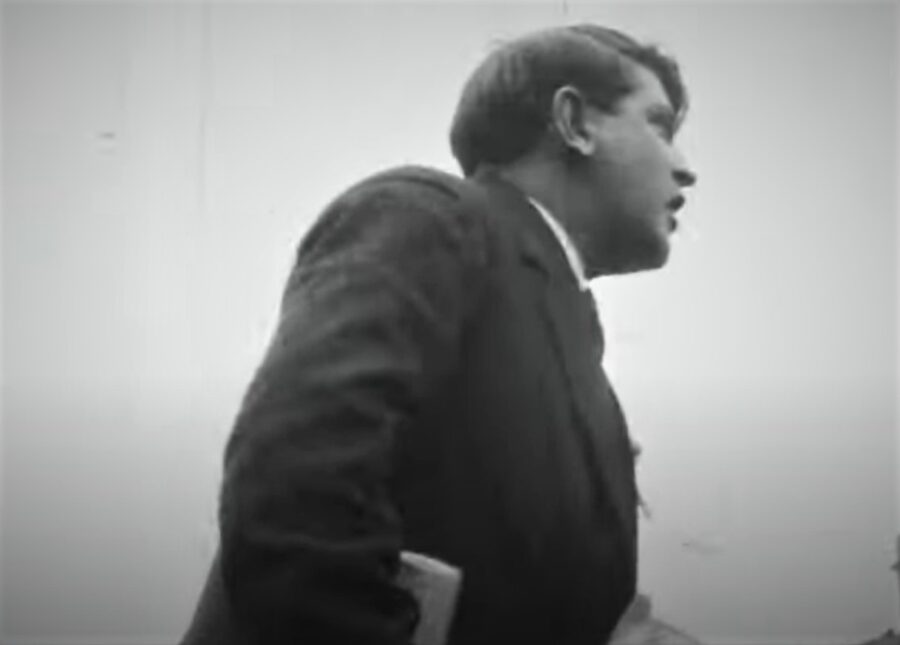
Kieran’s Our City, Our Town Article,
Cork Independent, 10 March 2022
Journeys to a Free State: Collins’ Rallying Call
The first political rally that Michael Collins attended outside Dublin to promote support for the Treaty was in Cork City. All of the regional newspapers of the time including the Cork Examiner had media spreads on the rally. On the second weekend in March 1922, Michael Collins travelled from Dublin to Cork by train, accompanied by Fionán Lynch TD, Commandant Seán MacEoin or MacKeown TD, Seán Milroy TD, and J J Walsh TD.
Michael Collins and Commandant MacKeown briefly addressed the large crowds that had foregathered at some of the railway stations – at Gould’s Cross, Thurles, Limerick Junction and Mallow. Long before the arrival of the train people before to assemble in large numbers in the vicinity of the Cork Terminus, admission to the platform was strictly limited to ticketholders.
On that Saturday afternoon, 11 March, Michael and colleagues were taken through the city in triumph, behind a number of bands. Not everyone was content to see them. A number of armed Republicans halted one band who has set out to meet Collins. They took their instruments at gunpoint and flung them into the River Lee. One band member leapt into the river to retrieve a drum, which was floating down the river. Gunshots were also fired in the air as Collins passed in his car through St Patrick’s Street towards his accommodation at Turner’s Hotel on Oliver Plunkett Street.
During Saturday evening, the two platforms set up on the Grand Parade for the rally the following day were damaged. The wooden planks were hurled into the river. In the area around Turner’s Hotel, Republican slogans were posted as well as several white flags in very visible places. The white flags were a message to Treaty supporters to consider surrendering their stance.
On Sunday morning 12 March, before the rally, Michael Collins and his colleagues, and now joined by other supporters attempted to visit the Republican Plot at St Finbarr’s Cemetery. They were met with twenty armed men telling them if they entered the plot area they would be shot. Meanwhile the special excursion trains from Youghal, Fermoy and Newmarket were raided by armed Republicans. Engine drivers and firemen were kidnapped. The passengers were left abandoned to fend for themselves.
Circa 50,000 people turned up on Cork’s Grand Parade for the rally. Every vantage point was used. At platform no.1, which was nearer to the National Monument Cllr Barry Egan presided as chairperson. The first speaker was Liam De Róiste, who was followed by Michael Collins. The core of Michael’s speech was basically a rebuttal of many of De Valera’s ideas he had presented in previous weeks at his own Anti Treaty rallies across the country. Michael noted: “The Irish people have not disestablished their democratic right to rule themselves. They have claimed that right and fought for it through many generations. They have now at last established that right. They have done more. They have secured recognition of that right by the power which through, all the centuries had denied it. The departure of his forces is the real recognition of that right. It was those forces alone that prevented the Irish people from exercising their right”.
Michael went onto comment on the Treaty negotiations and the success of the British army leaving the south of Ireland. He highlighted; “That interference has come to an end—that interference, the absence of which Mr De Valera lays down as the condition necessary for the existence of a Republic. We took a certain amount of government out of the hands of the economy while he was here. We took as much as we could. But we could not grasp all of it, because he used, the whole of his force to prevent us from doing so, and were unable to beat him out of the country by force of arms. But the enemy is going – will soon be gone, if, indeed Mr DeValera and his friends will but allow them to depart”.
Michael Collins was followed by Seán Hayes, Commandant Seán McKeown TD, Commandant Seán Hayes TD, and Diarmuid Fawsitt. During Seán McKeown’s speech shots were fired during his speech and continued interruptions of shouting was heard all the way to the end of the programme of platform no.1.
At platform no.2, the proceedings had scarcely started when elements of hostility were displayed right in front of the platform. A party of young men, numbering about twenty or thirty, congregated just under the rostrum on which Seán Jennings, Pro Treaty supporter and Chairman of the Cork Board of Guardians, had appeared to open the proceedings. They raised shouts of “Up the Republic”, sang the Soldier’s song, and generally created a din, drowning the voices of the speakers. Within a minute or two, revolver shots were fired into the air. Seán kept speaking but the interruptions drowned him out. At this point Commandant McKeown stood, who had moved over from platform no.1 stood up to take control of the deteriorating situation.
Booming at the crowd, MacKeown declared; “I am not going to be hounded down by four or five men. yes, we sung that when there was danger in singing it. We sang that when we fought for what it meant, and when there was danger in singing it. If Miss MacSwiney called us murderers we fought for the flag, and we are not going to be dictated to by Miss MacSwiney”. Pointing to the group from where the interruptions came, McKeown noted “These men are afraid to hear the truth; they are afraid to let the truth be told even in Cork.
At this juncture a photographer who said he was from an American News Agency appeared on the platform, and endeavoured to take a snap from near where the pressmen were seated. There was immediately an angry rush from the group of interrupters who focussed a revolver at the camera man. The photographer immediately backed down and disappeared from the platform.
Revolver fire became more intense and numbers of people congregated round the platform became alarmed, and there was a slight stampede. The din of the interrupters continued right throughout the meeting and the speakers, Seán Milroy TD, Fionán Lynch TD, J J Walsh TD, Pádraig O’Keeffe TD and Michael Collins TD (who had moved over from platform no.1) were heard with great difficulty.
Over the ensuing six weekends Michael Collins held political rallies from Skibbereen to Waterford, Wexford, Castlebar, Tralee, and Naas.
On the British Pathé YouTube channel there is a film piece entitled “Great Cork Treaty Meeting. Mr Michael Collins receives enthusiastic reception from the huge gathering despite salvoes of shots from a few malcontents”.
Captions:
1141a. Film still from British Pathé of Michael Collins and the crowds on the Grand Parade, Cork, Sunday, 12 March 1922.
1141b. Film still from British Pathé of Michael Collins speaking on the Grand Parade, Cork, Sunday, 12 March 1922.
